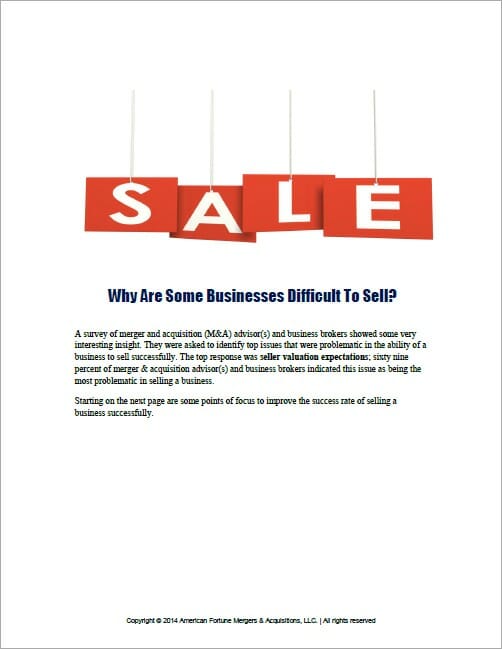Preparing to Sell a Business
Preparing to sell a business with the help of a merger and acquisition consultant. Statistics show that approximately 80 percent of businesses sell when they are marketed for sale. This means that approximately 20 percent of businesses never sell.
Sometimes business owners are their own worst enemies when preparing to sell a business.
A survey of merger and acquisition (M&A) consultants and business brokers showed some very interesting insight. They were asked to identify top issues that were problematic in the ability of preparing to sell a business successfully. The top response was seller valuation expectations; sixty nine percent of merger & acquisition consultants and business brokers indicated this issue as being the most problematic in selling a business.
Starting on the next page are some other reasons why many businesses do not sell.
The Top 10 Key Reasons Why Many Businesses Do Not Sell
- The valuation of the business is too high, in some cases by as much as 100%.
- The business has several family members in top management positions.
- The owner is the business. The business cannot effectively run without the efforts and know-how of the owner.
- One or two customers constitute more than 25% of the total business.
- The business’ industry is diminishing or threatened by globalization.
- The owner(s) is aging and has slowed-down, resulting in diminishing revenues.
- The owner did not take time to perform exit or succession planning. To properly prepare the business for sale, the owner should have engaged in exit planning 2-5 years prior to selling.
- Many of the financial rewards of the businesses were taken by the owner in various “perks” which, from a business valuation perspective, will not make it to the EBIDTA as add backs.
The seller did not take time to become educated on the selling process, especially on the possible ugliness of the due diligence process by the buyer and their consultant.
- The owner did not utilize the professional services of trusted mergers & acquisitions adviser or, in the case of a retail company or a small business, the services of a business broker.
Without properly preparing to sell a business and arming yourself with a proven mergers and acquisitions process, there will be a huge business valuation gap between what the business seller expects to receive and what a reasonable buyer sees as fair market price.
Selling a business takes years of preparation and the use of a proven process. Additionally, it is time consuming. A business owner trying to keeps their business running smoothly while, at the same time, trying to sift through streams of bargain hunters can be daunting. Without a proven process, a formal business valuation, and a good amount of preparation, these bargain hunters will chip away at the seller’s asking price.
What About B2B and Larger Businesses?
For owners of B2B businesses and large businesses, your buyer will not be an individual, but rather a corporation or a private equity group. If the potential buyer has revenues up to $100 million, the mergers and acquisitions contact is usually the president.
If the company is larger, the contact is typically the head of strategy, business development or merger and acquisition services. The first task is to recognize that reaching these corporate buyers is a very difficult and a labor intensive process. In these situations, it is wise to enlist the services of a mergers & acquisitions consulting firm that specializes in reaching these targeted buyers.
Summary
In summary, it cannot be stressed enough for properly preparing to sell a business. The process to properly prepare a business for sale takes approximately 2-5 years, it is not very costly, and it does not take much time but the results can be phenomenal and will bring about a much higher business valuation, better terms and a faster sale.
Eleven Tips to Preparing to Sell a Business Successfully
- Price It Right. A typical mergers and acquisitions consultant or business broker just can’t bring themselves to tell you that your business is overpriced. Don’t shoot your merger and acquisition consultants for valuing your business realistically and don’t choose a mergers & acquisitions advisor on the basis of which one values your business at the highest price just so that they can get a listing.
- The price (valuation) of your business needs to be realistic. The best way to accomplish this is to have your business valued by a third party valuation expert knowledgeable in the science of business valuations as well as the market forces that shape the business valuation. Businesses that use a third party business valuation are much more likely to sell at a higher price.
- Those who do not use mergers & acquisitions advisor services or a qualified business broker combined with a third party business valuation service only have a 10% chance of selling a business at all.
- Your tendency will be to overprice your business. Overpricing the business will result in taking a longer time to sell the business or it may never sell at all.
- Additionally, a business that stays on the market for more than 18 months has an increased chance that employees, competitors, clients and other parties will learn that the business is listed for sale. Such information in the wrong hands could devastate the health of any business for sale.
- Furthermore, a business listed for sale for too long is often viewed by buyers as shopworn merchandise by the time it finally sells, if it sells at all. Nothing raises the doubts of a prospective buyer more than to find out you’ve been trying to sell your business for a long time (18 months or longer).
- Prior to marketing the business for sale, have a professional business valuation performed. A credible and defensible business valuation will greatly solidify a true market value of a business. Depending on the type of a business being valued and the detail and length of a valuation, the price can be anywhere from $2,000 to $8,500. The money spent on a good business valuation will more than pay for itself in the end.
- Fixtures, Equipment & Facility. Business buyers expect that all the equipment be routinely serviced and in good working condition. Prepare a detailed list of equipment with model numbers and serial numbers. Buyers may also want to have a third party inspection as well a formal valuation of the equipment and fixtures.
- Businesses with clean financials, good records, clean facility and premises, and quality and up to date equipment will receive good consideration by buyers. Most buyers will likely deduct a significant amount from the asking price if one or several areas of the business is not presentable or poses shortcomings.
- In Preparing to Sell a Business, have A Good Reason To Exit & Sell A Business. Buyers are always concerned about the reason for the sale of a business. They are afraid you may be selling a business because of a declining industry, the effects of globalization, competitor dominance or some undisclosed fact that may negatively effect and hurt the business in future years.
Buyers want to hear a valid and logical reason for the sale. Without a good reason for a sale, business buyers may assume the worst and either offer you a lower price (valuation) or just walk away.
- Form An Advisory Team. In preparing to sell a business successfully you need to have the right group of experts. Start by searching for the services of a credible mergers & acquisitions advisor followed by an attorney with merger and acquisition transaction experience.
- Your accountant will also need to be involved in some aspects of the business sale. Your merger and acquisition adviser will play the most critical role in the sale of your business therefore, they need to be qualified and experienced with mergers and acquisitions services, exit planning, business valuation and many other matters so you can achieve a predictable and successful outcome in the sale of your business.
- Today, selling a business is so specialized it becomes imperative to engage the services of a mergers & acquisition adviser, investment banker or business broker (for retail or small businesses).
- The best attorney or accountant is no substitute for a specialized and knowledgeable merger and acquisition advisor who is experienced in all areas of selling businesses including business valuation, tax matters, deal structuring, problem solving and creative solutions.
- Prepare A Good Marketing Package. A good and proper marketing package to sell a business is absolutely critical. Additionally, being prepared to answer questions during the buyers due diligence process takes extensive preparation.
- To anticipate the buyers due diligence, it is best to prepare a detailed offering memorandum package to present to buyers when marketing your business for sale. In the age of computers and readily available data and information, buyers can become quite informed. Business buyers will likely solicit a professional expert in business valuation services.
- The buyers and their experts will challenge you to justify your price and terms of sale based upon their understanding of normal investment returns and risk factors found in the open financial markets.
- Having a professional business valuation report will go a long way in defending your price against such challenges. You also have to compete for a prospective buyer’s attention against an ever-increasing number of sophisticated groups trying to sell other types of businesses and investments.
- You must educate yourself about the types of buyers that exist in the marketplace. After studying buyers you will have a better idea which buyer to seek out for your business: a financial buyer, a corporate buyer, a private buyer or a strategic buyer.
- To assure that the buyer is qualified to buy and operate your business, you must learn how to carefully screen and qualify the buyer. Your mergers & acquisitions adviser or business broker can set-up a process to target and qualify these prospects. Desire to buy is not proof of a business buyers’ ability to buy and operate a business successfully.
- Be very careful in the review and qualification of buyers. Many buyers do not have the money, skills or vision to successfully buy and operate a business.
- Depending on myriad of factors, it may take 6 months to 2 years to sell a business. It is critical to keep your marketing efforts confidential except to very qualified prospects.
- A qualified mergers and acquisitions consultant will be aware of all of these issues and will walk you through the process of selling your business with successful results.
- Negotiate Professionally. When you identify an interested and qualified buyer prospect, plan your negotiation strategy carefully. Your mergers and acquisitions adviser will facilitate the process, so follow their advice.
- Remember that your goal is to sell a business and not beat the buyer at some negotiation game. You and the merger and acquisition consultant should carefully strategize on all of the negotiation points.
- Give in slowly and carefully and always ask for a concession point in exchange from the buyer and his team of advisers. Have clear goals in mind to sell the business and do not get hung up on technicalities otherwise you will win the battle but lose the war.
- Don’t allow yourself to get bogged down in disputes or become emotionally involved with the buyer.
Don’t allow your ego and pride to distract you from satisfying your underlying goal to sell your business.
- You do not need to become friends with the buyer, but understanding their circumstances and goals will help you negotiate better. Focus the negotiation on things that are common to you and the buyer.
- Spend time brainstorming numerous options with your mergers and acquisitions adviser and you will likely come up with many solutions before deciding what to do about any particular problem. Begin by negotiating the easier points and then move to resolving the more difficult points.
- Wrap-it-Up Quickly. Even the best buyer prospects can change their minds overnight. After the buyer prospect makes a commitment to buy your business, get an offer to purchase in writing and get a good-sized, non-refundable earnest money deposit.
- After the offer to purchase agreement is signed begin to negotiate the finer points and begin the process of drafting a definitive sales agreement along with all of the other closing documents and prepare to close on the business as soon as possible.
- Your business isn’t sold until the money is in your hand. Make sure your check clears before you set plans in motion for investing, spending the money or taking a well deserved exotic vacation.
Preparing to sell a business, contact
Brian S. Mazar, MBA, CBI
American Fortune Mergers & Acquisitions
mazar@fortunebta.com
www.fortunebta.com
502-244-0480







